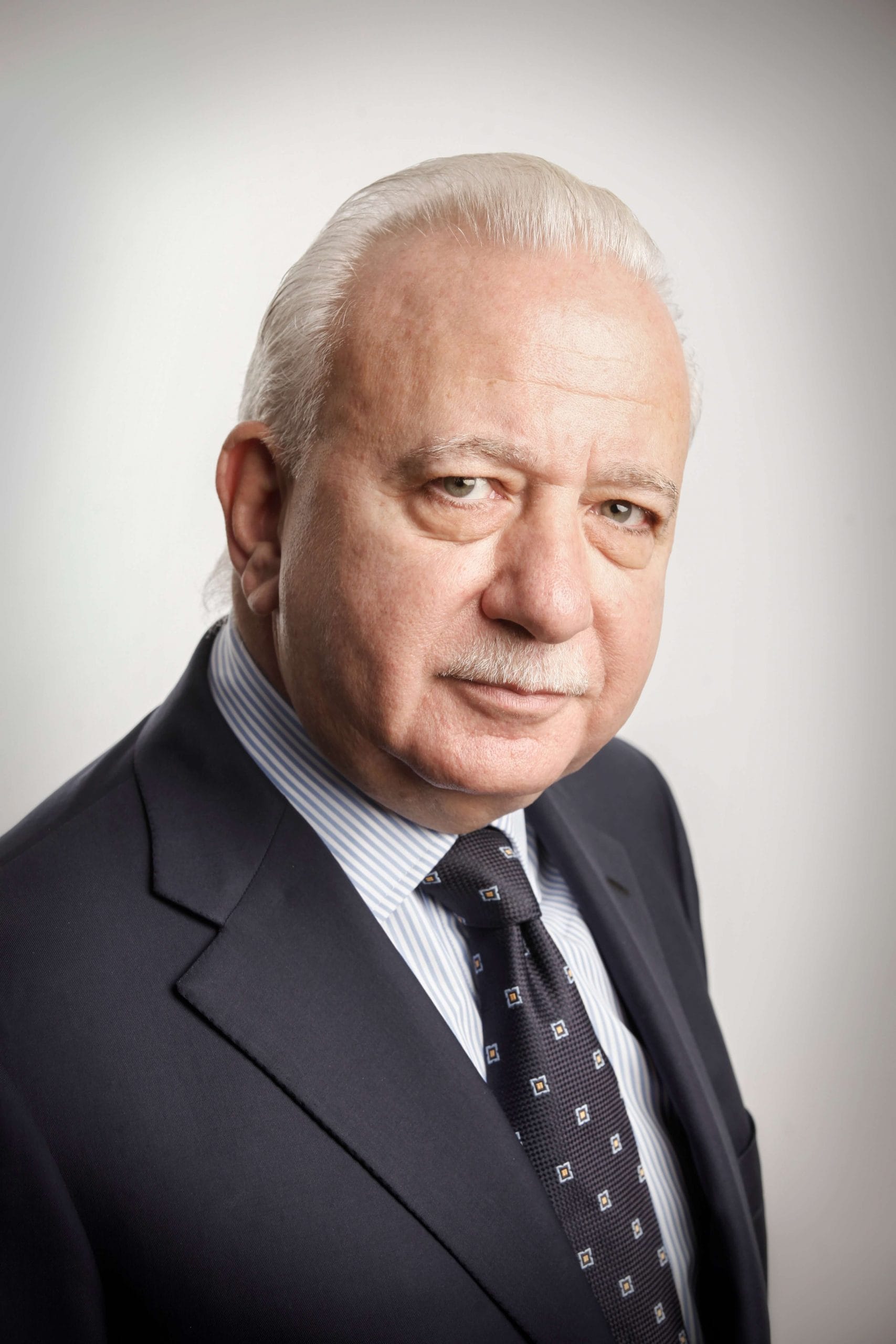Steve Morgan discusses how he applied the principles of construction to philanthropy.
Stelio Stefanou: Fighting domestic abuse through philanthropy
 Philanthropist Stelio Stefanou uses his resources to address intergenerational domestic abuse at its root – he does this via The For Baby’s Sake Trust.
Philanthropist Stelio Stefanou uses his resources to address intergenerational domestic abuse at its root – he does this via The For Baby’s Sake Trust.
Quick facts
The cause
- Domestic abuse
The funding
- The For Baby’s Sake Trust
The journey
- Sell your business.
- Focus on charity.
- Research the issue.
- Assemble a specialist team.
- Test the programme.
The philanthropy journey
Stelio Stefanou began his philanthropic journey following a career spanning the oil, construction and public service sectors. After selling his public services management company, Accord, in 2007, Stelio decided to focus on addressing social issues through involvement in the charity sector rather than continue to pursue his business career.
 Around the same time, the death of ‘Baby Peter’ was highly publicised in the British media. This case had seen 17 month old Peter Connelly killed by his mother and her boyfriend, the end result of many months’ worth of child abuse inflicted on Peter.
Around the same time, the death of ‘Baby Peter’ was highly publicised in the British media. This case had seen 17 month old Peter Connelly killed by his mother and her boyfriend, the end result of many months’ worth of child abuse inflicted on Peter.
Impacted in part by the severity of this case, Stelio established a charity, now known as The For Baby’s Sake Trust, which works to break the intergenerational cycle of domestic and child abuse. Stelio chairs the charity and funds it philanthropically through The Stefanou Foundation – it is the foundation’s main funding focus.”
When did you get into philanthropy?
“During my business career, I was always just at the margins of philanthropy. When people would approach, I would always want to help where I could but I was never really fully involved. Having enjoyed the many years I spent in the business world, and after selling Accord, a new passion took over which was to understand what leads to the sort of abuse resulting in the death of a baby, and how it can be addressed.
What made you want to focus on addressing domestic abuse?
“I used to travel quite a lot in my work with Accord. You see a lot of different areas of the country and realise that some of them have enormous difficulties. You start questioning what goes on behind some of these doors. That was increasingly on my mind.
“When Baby Peter died, my thinking on this intensified. I started wondering whether it was a one-off incident or if it represented a wider issue of abuse. People were being blamed at every step of the way during the case, but I kept coming back to the same thought: blaming people alone is not going to save any babies; we also need to understand the issue.”
Following Accord’s sale, Stelio had the time and resources to commit to addressing domestic abuse. He put together a small team of specialists in victim support, perpetrator support and infant mental health. They spent two years researching the problem, and a further two years designing a programme to address it.
The ambition was to draw on each specialist’s expertise in order to create a truly holistic programme through which families could break the cycle of domestic abuse. The resulting programme – For Baby’s Sake – works with families for a period of up to two and a half years, from pregnancy until the baby is two years old.
In the early days of For Baby’s Sake, did you have any doubts?
“I did. When you spend so long looking into domestic abuse, you realise that it’s a phenomenally large issue. At the beginning, I felt ill-equipped to understand it very well. One in five children are touched by domestic abuse in the UK, so it seemed overwhelming at times. I was left with a choice: did I want to stick to the margins again – writing a cheque or two here or there – or was I going to try and understand it? I chose the latter.
“On top of this, we received quite a bit of push-back in the early days because we wanted our programme to help both partners in an abusive relationship. Some people said what we were doing was morally wrong. While I understood their opinion, it never made me doubt our process. We looked at it this way: if we never help the people who use domestic abuse, how will we ever reduce it? And reducing the harm associated with domestic abuse, fundamentally, is what we all want.
How important was it for the programme to be funded philanthropically?
“It was essential. For Baby’s Sake needed the time and the funding to be developed and tested which was best achieved through private philanthropy. This is not because those working in the public sector don’t want to solve the problems – because they really, really do – it’s just that their elbow room is so restricted.
“Being philanthropically funded, we had the ability to develop the programme and prove its value – to prove that it works. Now that we have done that, we’re working with local authorities to implement it up and down the country.”
Beyond the obvious benefits of the programme, addressing domestic abuse has far-reaching social improvements. These include a reduced strain on health, prison and judicial services, a reduction in substance misuse and self-harm, and an improvement in children’s educational achievements. For the team, these broader social implications were factored in when designing the programme.
“Research has found that children who were exposed to high levels of domestic violence as babies had IQs, by the age of eight, that were around 7.25 points lower on average than those without that experience. That is substantial. When combined with the lack of secure attachment, the result is that these children often do less well at school and less well in holding down a job. This, in turn, may lead such children into substance misuse and criminal activity. There is a huge social cost.
“But the most important cost, for me, is the wasted lives which result from unaddressed domestic abuse. Each one of the people involved in domestic abuse goes through their life not having been the person they could have been. It is about people being able to lead a fulfilled life.”
Does hearing personal success stories spur on your philanthropy?
“It plays an enormous role. Real lives are at the core of the work that we do. One particular story always stands out to me.
“We had a family referred to us at pregnancy stage. When the father came in for an initial discussion, he appeared to be quite aggressive. Our practitioners were concerned about this but the team discussed it and decided to work with the family. So, the family joined the programme and went through all the modules.
“About two-and-a-half years later, it was the last session with the practitioner. The father got up and said, ‘I’m not good with goodbyes’ and placed a ‘thank you’ card on the table. On his way out of the door, he turned around and said to the practitioner, ‘You know, you’re the first person ever to ask what happened to me. Without you, I might be in prison now and I wouldn’t have contact with my children.’
“It turned out he had been a victim of childhood abuse. He was an angry person who didn’t know how to deal with what had happened to him other than by throwing punches. It was only when the practitioner went through the course with him and helped him understand what was happening to him that he was able to come to terms with it. For me, stories like this always come back as a profound reminder of why we’re doing what we’re doing.”
While The Stefanou Foundation is now primarily focused on The For Baby’s Sake Trust, Stelio also contributed to the Royal Society’s Enterprise Fund, a fund that supports science for social benefit. He attributes his interest in this to his degree in chemistry, something which opened his eyes to the vital role science plays in social development. He has similar thoughts about the role of philanthropy in social improvement.
“A private philanthropist – who is, in a sense, providing ‘risk money’ to address an issue – has got the freedom to approach it in a different way to government. If government followed a similar course of action, it might be accused of wasting public money. A philanthropist can’t be criticised in the same way because they’re using their own money. If the idea works – great! Government can invest in it with more confidence. It if fails – it’s less of a problem. Government hasn’t wasted taxpayer money.”
Advice for philanthropists
“It’s useful – right at the start – to give some thought to what sort of philanthropy you want to engage in. It’s perfectly fine to give money at arm’s length to programmes or initiatives that are already happening. That’s one effective way of supporting positive change.
“But others don’t enjoy simply writing cheques. They will come across an intractable problem and realise that there must be a solution and that they have the resources and time to be able to take a deeper look at it. I realised that I fell into this category.
“People tend to be naturally inclined to one or the other of these two ‘types’. There’s no point in being one if you’re actually the other. If you’re someone who likes to dig deep and see something through, you won’t be content just writing the odd cheque out. If, on the other hand, you’re somebody who has a broader range of interest, you might be better placed to identify causes and provide resources to them without becoming too deeply involved yourself. Just try to work out which ‘type’ you are.
“And finally, do philanthropy for the right reasons – do it with an open heart.”